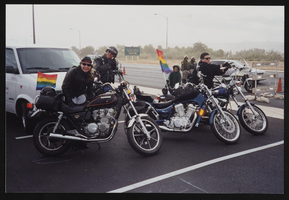Search the Special Collections and Archives Portal
Search Results
Pat Feaster oral history interview
Identifier
Abstract
Oral history interview with Pat Feaster conducted by Claytee D. White on July 1, 1996 for the African Americans in Las Vegas: a Collaborative Oral History Project. In this interview, Feaster relates how her mother made the decision to leave Fordyce, Arkansas for better economic opportunity and moved to Las Vegas, Nevada in 1942. She describes travelling across the country, living in a one-room structure in the Westside of Las Vegas, and attending the Westside School. She discusses her mother's employment at the Red Rooster Restaurant and then at the Algiers Hotel. She talks at length about her own educational journey after leaving school at fifteen, then returning for her GED and later, a college degree after the birth of her fifth child. She discusses how the decision to improve her education helped her develop a twenty-six year career at the Clark County Health District. She also discusses the Fordyce Club and many important personalities in Las Vegas' Black community.
Archival Collection
Corey Nyman oral history interview
Identifier
Abstract
Oral history interview with Corey Nyman conducted by Claytee D. White on May 04, 2018 for the Remembering 1 October Oral History Project. In this interview, Nyman recalls his high school and college experiences, and working in Las Vegas, Nevada as a young adult. On October 1, 2017, Nyman attended the Route 91 Country Music Festival with his brother and a group of friends. They enjoyed the concert from the Red Bull VIP suite, which Nyman felt helped them escape bullets as he and his friends helped others escape. About three hours after escaping the venue, they arrived at Tropicana Avenue and Koval Lane where their ride picked them up. The driver was one of the last allowed into the area under the airport underpass. Nyman discusses his feelings since the shooting, and states that he loves the city and has made it his home despite the traumatic events of the night.
Archival Collection
Donna George oral history interview
Identifier
Abstract
Oral history interview with Donna George conducted by Barbara Tabach on May 14, 2012 for the Boyer Early Las Vegas Oral History Project. In this interview, George discusses growing up in Las Vegas and the changes in the city. She then talks about her husband, David George, and his employment at the Nevada Test Site. George recalls David’s transportation to and from the test site, how the two would communicate when David was working, and concerns about exposure to radiation. Lastly, she discusses the change from aboveground testing to underground testing.
Archival Collection
Vincent Kethen oral history interview
Identifier
Abstract
Oral history interview with Vincent Kethen conducted by Claytee White on December 23, 2009 for the Voices of the Historic John S. Park Neighborhood Oral History Project. Kethen was born in 1964 in Las Vegas, Nevada, the year that desegregation of schools started there. He discusses his experiences as an African-American child being bused to a white school, John S. Park Elementary. He also discusses growing up in that era and giving back to the community by being a youth basketball coach.
Archival Collection
J. A. Tiberti oral history interview
Identifier
Abstract
Oral history interview with J. A. Tiberti conducted by Terry Mowbray on February 23, 1977 for the Ralph Roske Oral History Project on Early Las Vegas. In this interview, Tiberti discusses his personal history before arriving to Las Vegas, Nevada in 1941 as a civil engineer for Nellis Air Force Base. Tiberti recalls the plane crash involving Carole Lombard in 1942 and describes his work in assisting to locate the plane. He then discusses the construction projects he worked on and environmental changes around Las Vegas. Lastly, Tiberti describes his construction company, J. A. Tiberti Construction.
Archival Collection
Charles West oral history interview
Identifier
Abstract
Oral history interview with Charles West conducted by Perry Kaufman on April 19, 1974 for the Ralph Roske Oral History Project on Early Las Vegas. West discusses the African American community in Las Vegas, Nevada and what the living conditions were for them. West then explains how the Nevada Voters League changed the way politics played out after more African Americans went out to vote. He also discusses his work as the first African American Doctor in Las Vegas.
Archival Collection

Dykes on Bikes at the second annual Gay Pride parade, image 001: photographic print
Date
Archival Collection
Description
Image

Dykes on Bikes at the second annual Gay Pride parade, image 002: photographic print
Date
Archival Collection
Description
Image
Publications: Gay Entertainment Directory v. 2:3, 2014 August-September
Level of Description
Archival Collection
Collection Name: Dennis McBride Collection on LGBTQ Las Vegas, Nevada
Box/Folder: Box 22
Archival Component
D. D. Cotton oral history interview
Identifier
Abstract
Oral history interview with D. D. (Ethel Dolores) Cotton conducted by Claytee White on February 14, 1997 and March 21, 1997 for the Women's Research Institute of Nevada (WRIN) Las Vegas Women Oral History Project. In this interview, Cotton discusses the beginnings of her dance career in New York City, New York. Later in the interview, Cotton discusses working in Las Vegas, Nevada at the Cotton Club and her interactions with other African American entertainers. Cotton also discusses race relations and her experiences as an African American dancer in Las Vegas. Cotton later goes on to discuss her career change in the service industry.
Archival Collection
